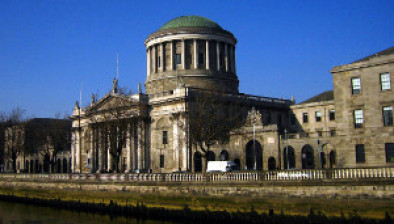NI: Proposals to reform family reunification rules welcomed by rights campaigner Emma DeSouza
Proposals to reform family reunification rules for people in Northern Ireland have been welcomed by immigration rights campaigner Emma DeSouza.
Speaking to Irish Legal News, Mrs DeSouza said the proposed changes would “lift a tremendous weight off many families”, but warned that the proposals did not address wider citizenship issues raised by her ongoing high-profile case before the Court of Appeal in Belfast.
The proposals are included in a draft deal for the re-establishment of devolution in Northern Ireland, which was published by the British and Irish governments last night and is now under consideration by the Stormont parties.
The deal states: “The Government has reviewed the consistency of its family migration arrangements, taking into account the letter and spirit of the Belfast Agreement and recognising that the policy should not create incentives for renunciation of British citizenship by those citizens who may wish to retain it.
“The Government will change the rules governing how the people of Northern Ireland bring their family members to the UK. This change will mean that eligible family members of the people of Northern Ireland will be able to apply for UK immigration status on broadly the same terms as the family members of Irish citizens in the UK.
“This immigration status will be available to the family members of all the people of Northern Ireland, no matter whether they hold British or Irish citizenship or both, no matter how they identify.”
Mrs DeSouza’s US-born husband Jake applied in 2015 for a residence card as the spouse of an EEA national, but was refused on the basis that she did not fall within the definition of “EEA national” as a “national of an EEA state who is not also a British citizen”.
She has argued, however, that this comes into conflict with the Good Friday Agreement, which sets out “the birthright of all the people of Northern Ireland to identify themselves and be accepted as Irish or British or both, as they may so choose”.
An immigration tribunal found in favour of the couple in 2017, but the decision was overturned by the Upper Tribunal (Immigration and Asylum Chamber) last October.
The tribunal said that the birthright to be “Irish or British, or both” contained in the Good Friday Agreement, “whilst binding in international law, does not thereby make it binding under the domestic law of the United Kingdom”.
Mrs DeSouza, who is currently challenging the tribunal ruling in the Court of Appeal, told Irish Legal News that the proposed changes to the UK’s “draconian” immigration policies are “an unexpected and welcome addition to the Stormont deal”.
She continued: “The Home Office policy of denying the family reunification rights of Northern Ireland-born Irish citizens was deeply flawed and had an immensely negative impact on the citizenship and identity provisions of the Good Friday Agreement.
“What this proposal has the potential to do is to remove an obstacle to rights. With the appropriate legislation, it is our hope that no other Irish citizen in Northern Ireland will be forced to first declare themselves as British in order to renounce being British so that they can access the same family reunification rights as other Irish and EU citizens resident in the United Kingdom.
“This change would also benefit British citizens in Northern Ireland, providing a levelling up of family reunion rights on a no detriment basis. This change will lift a tremendous weight off many families in a similar position to us and represents a change in tone from the British Government.”
“However,” she added, “it does not address the wider citizenship issues and UK’s failure to adequately implement the birthright provisions of the Good Friday Agreement into domestic UK law.”









